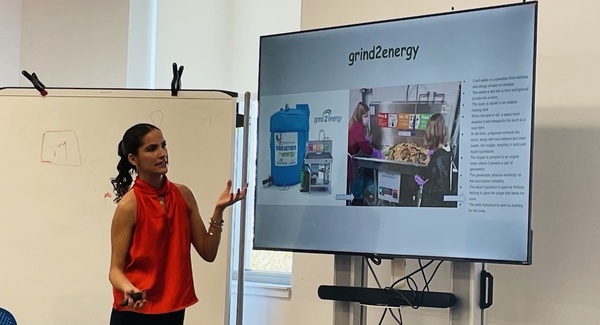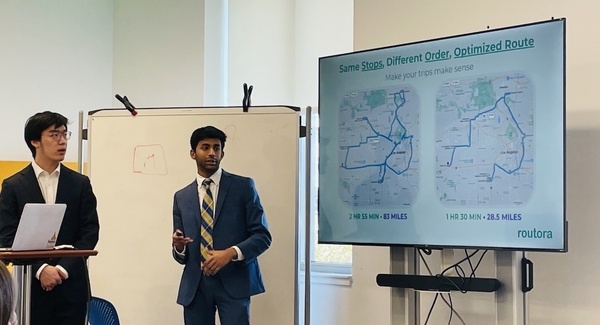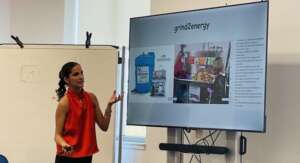
Claudia Interiano isn’t the first Notre Dame student to find inspiration over shared meals in the University’s dining halls. But she wasn’t working through a particularly tricky statistics problem or honing her approach to an essay through a conversation with friends.
No, she was thinking about the food around her that was getting thrown out.
It’s a scenario that is hardly unique to Notre Dame. According to the United Nations, around 40 percent of the food supply in the United States ends up in landfills. And it was in this local manifestation of a nationwide problem that Interiano saw an opportunity.
After doing some research, she learned that Notre Dame’s dining hall supply chain is made up of four main tools, each with its own purpose in the food waste management process. There’s one primarily for inventory management and another that promotes food waste prevention. The University also has a partnership with the food rescue organization Cultivate Culinary, which repackages excess food into high-quality, well-balanced meals for food-insecure families throughout the Michiana region.
Interiano’s pilot project is focused on the fourth tool, Grind2Energy, a sustainability system used by a number of commercial facilities across the country to process non-consumable food waste into a slurry that can then generate energy while also producing fertilizer and even bedding for cattle. At Notre Dame, the slurry goes to an area dairy farm.
In the undergraduate course “AI for Good,” Interiano began developing food management software powered by artificial intelligence that would work with Grind2Energy as an add-on to the popular technology.
“My AI model optimizes the dining hall supply chain by addressing key challenges and drawbacks of the current Grind2Energy system,” said Interiano, who graduated in May with a major in business analytics and a minor in energy studies. “It measures the proportions of different food waste, ensuring accurate and efficient processing. The model guarantees the right proportions of waste are processed, reducing contamination and waste. By detecting clogs or jams, our AI model prevents accidents and minimizes downtime for a more sustainable waste management system.”
“AI for Good” is taught by Georgina Curto Rex, a postdoctoral fellow at the Notre Dame Technology Ethics Center (ND TEC), and can be counted toward the undergraduate minor in tech ethics. The course is centered around a semester-long project that calls on students to craft a business plan that leverages AI not only to pursue entrepreneurial aims but also to advance at least one of the UN Sustainable Development Goals.
Interiano initiated her “Reduce, Recover, Rescue” project as part of the course this past semester and has already met with Cheryl Bauer, the director of supply chain and sustainability in the University’s Campus Dining office, to discuss it further.
In April, Interiano and several other students from the class also had the chance to practice pitching their projects to coaches from Notre Dame’s IDEA Center. Among them was sophomore Brian George, but his is a project that he has been working on for more than a year and that he continued to refine and move forward in partnership with another student in Curto’s course.

Called Routora, it is a browser-based extension for Google Maps that rearranges a trip with multiple stops into the fastest route, saving money and reducing emissions. Envisioned mainly as a tool for delivery drivers, Routora has grown from just over 20 to approximately 10,000 users since last spring, and the company is preparing to launch it as a mobile app for both iOS and Android devices.
In addition to George, a finance major minoring in history, the Routora corporation consists of fellow Notre Dame student Luke Blazek as well as Tom Vazhekatt, a student at The University of Texas at Dallas.
“The ‘AI for Good’ course has helped guide Routora’s ongoing app development process to ensure responsible and ethical AI usage by prioritizing user privacy, data security, and equitable access,” George said. “The course also has expanded our knowledge of AI applications for social good, inspiring the team to continue promoting eco-friendly transportation and improving access to essential services.”
Though not a part of the corporation, David Lim, a sophomore majoring in finance with a minor in data science, teamed up with George in “AI for Good” to work on Routora.
“The course allowed us to advance our project and help develop our mobile app thanks to the practical resources given by our professor and the Notre Dame IDEA Center,” Lim said. “This, along with our class discussions revolving around the ethical considerations of AI, made it possible for us to better understand the potential social and sensible applications of AI from a macro perspective and in our work.”
Curto plans to offer the “AI for Good” course again in Spring 2024. For a list of tech ethics classes being taught this fall, visit techethics.nd.edu/courses.
Originally published by Notre Dame Technology Ethics Center at techethics.nd.edu on May 23, 2023.
